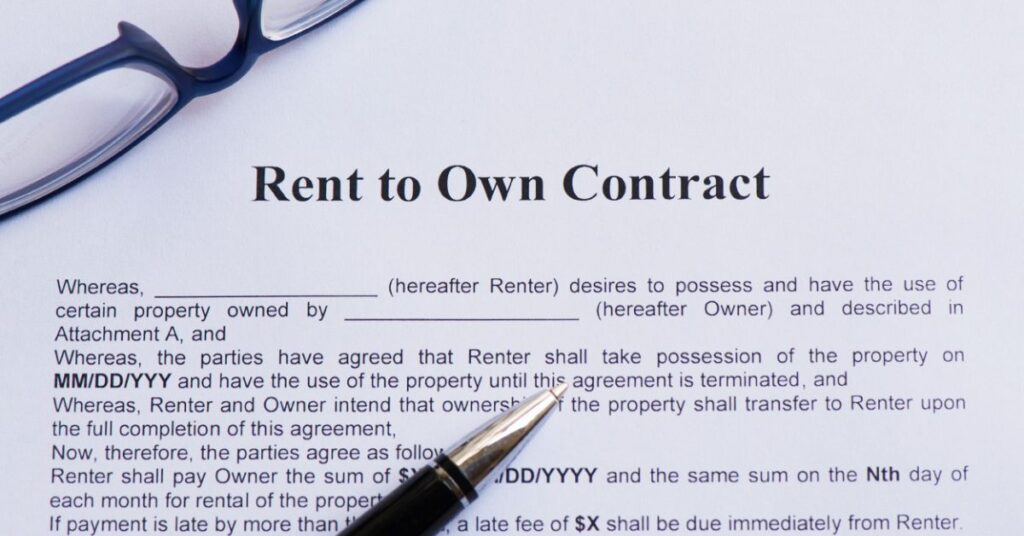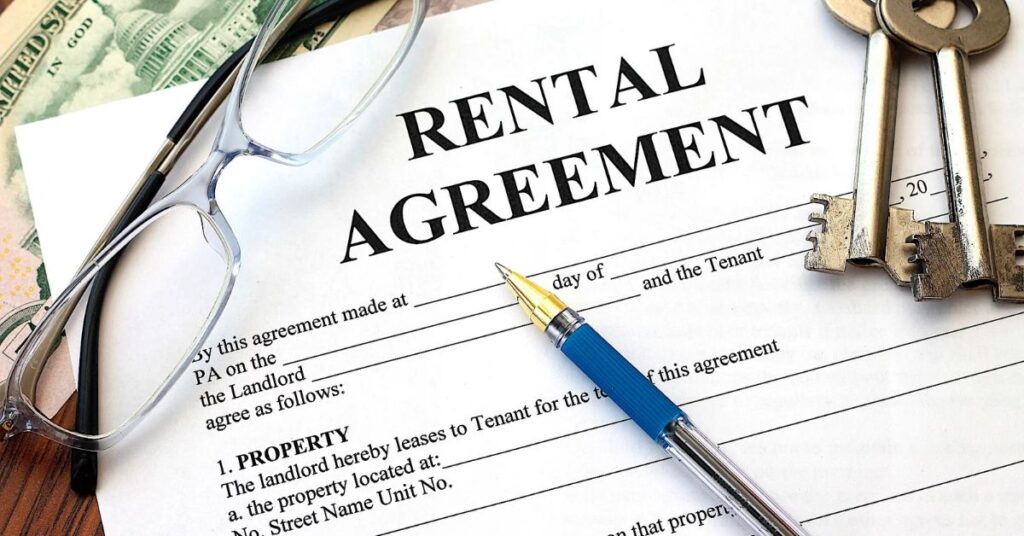Rent-to-own contracts offer a unique path to homeownership, blurring the lines between renting and owning. However, the possibility of a landlord terminating such an agreement raises concerns.
Determining the legality and implications of a landlord breaking a rent-to-own contract requires a thorough examination of the contract terms, local rental laws, and the circumstances surrounding the decision.
Although landlords typically retain the right to terminate leases under specific conditions, ending a rent-to-own contract involves complexities. Tenants who have invested time and resources into the property may have legal protections. Delving into the specifics of rent-to-own agreements and seeking legal guidance can shed light on the rights and remedies available to both parties.
When Can a Seller Back Out of a Rent-to-Own Agreement?
In a rent-to-own agreement, the seller typically retains the right to withdraw from the contract based on specific circumstances outlined within the agreement. These circumstances might include the buyer’s failure to adhere to contractual obligations, such as making timely payments or violating the terms and conditions stipulated in the agreement.
Moreover, if the seller secures another buyer who wishes to purchase the property outright, they may opt to terminate the rent-to-own agreement. However, it’s crucial to emphasize that the conditions permitting the seller to withdraw must be explicitly stated in the contract to prevent potential disputes or legal complexities.
It’s prudent for both parties to thoroughly review and understand the contract terms before entering into a rent-to-own arrangement, and seeking legal guidance can provide further clarity and protection in such scenarios.
The Basics Of Rent To Own Contracts

Rent-to-own contracts offer a unique pathway to homeownership, blending aspects of renting and buying. In essence, these agreements allow tenants to lease a property with the option to purchase it at a later date, usually within a specified timeframe. The basic structure involves two main components: the lease agreement and the option to purchase.
Firstly, the lease agreement outlines the terms of the rental period, including the monthly rent, duration of the lease, responsibilities of both parties and any additional clauses specific to the property.
Secondly, the option to purchase grants the tenant the right, but not the obligation, to buy the property at a predetermined price within the agreed-upon timeframe. Typically, a portion of the monthly rent is set aside as a “rent credit” which can be applied towards the purchase price if the tenant decides to buy the property.
It’s essential for both landlords and tenants to thoroughly understand the terms of the rent-to-own contract before agreeing. Legal consultation and clear communication can help ensure that all parties are protected and aware of their rights and responsibilities throughout the contract.
Lease/Rent Agreement
| Lease/Rent Agreement |
| Parties Involved |
| Landlord: [Name], [Contact Info] |
| Tenant: [Name], [Contact Info] |
| Property Description |
| Address: [Property Address] |
| Description: [Property Details] |
| Rental Term |
| Duration: [Fixed Term/Month-to-Month] |
| Rent Amount and Payment Schedule |
| Monthly Rent: [Amount] |
| Due Date: [Date] |
| Late Fees: [Details] |
| Security Deposit |
| Amount: [Deposit Amount] |
| Conditions: [Return Details] |
| Responsibilities of Parties |
| Landlord: [Maintenance, Utilities, Rules] |
| Tenant: [Payment, Maintenance, Compliance] |
| Occupancy Limits |
| Maximum Occupants: [Number] |
| Subleasing: [Allowed/Not Allowed] |
| Repairs and Maintenance |
| Reporting Procedure: [Details] |
| Responsibilities: [Clarification] |
| Termination and Renewal |
| Notice Period: [Details] |
| Renewal Options: [Yes/No] |
| Legal Provisions |
| Eviction Process: [Details] |
| Dispute Resolution: [Procedure] |
| Applicable Laws: [State/Local] |
Purchase Option
| Lease/Rent Agreement |
| Parties Involved |
| – Landlord: [Name], [Contact Info] / Tenant: [Name], [Contact Info] |
| Property Description |
| – Address: [Property Address], Description: [Property Details] |
| Rental Term |
| – Duration: [Fixed Term/Month-to-Month] |
| Rent Amount and Payment Schedule |
| – Monthly Rent: [Amount], Due Date: [Date], Late Fees: [Details] |
| Security Deposit |
| – Amount: [Deposit Amount], Conditions: [Return Details] |
| Responsibilities of Parties |
| – Landlord: [Maintenance, Utilities, Rules], Tenant: [Payment, Maintenance, Compliance] |
| Occupancy Limits |
| – Maximum Occupants: [Number], Subleasing: [Allowed/Not Allowed] |
| Repairs and Maintenance |
| – Reporting Procedure: [Details], Responsibilities: [Clarification] |
| Termination and Renewal |
| – Notice Period: [Details], Renewal Options: [Yes/No] |
| Purchase Option |
| – Option to Purchase: [Yes/No], Purchase Price: [Amount], Option Period: [Duration] |
| Legal Provisions |
| – Eviction Process: [Details], Dispute Resolution: [Procedure], Applicable Laws: [State/Local] |
Rent To Own Eviction Laws
In the realm of rent-to-own agreements, understanding eviction laws is paramount for both landlords and tenants. Eviction processes in these arrangements typically follow established legal procedures, which may vary depending on jurisdiction.
Landlords must adhere to specific protocols outlined by local laws when initiating eviction proceedings against tenants in rent-to-own agreements. These procedures often involve providing notice to the tenant, followed by a period for remediation or negotiation before further legal action.
Moreover, tenants in rent-to-own agreements are afforded certain rights and protections under the law. These protections may include safeguards against unjust eviction, the right to challenge eviction proceedings, and the opportunity to seek legal recourse in case of disputes.
However, tenants should be aware of their obligations outlined in the rent-to-own contract and strive to fulfill them to mitigate the risk of eviction. Consulting with legal professionals familiar with rent-to-own laws can provide invaluable guidance and assistance in navigating eviction-related issues within these unique housing arrangements.
Basics of Rent-to-Own Agreements
Rent-to-own agreements serve as a hybrid between renting and homeownership, offering a unique pathway for tenants to eventually own the property they currently lease. In essence, these agreements consist of two primary components: the lease agreement and the option to purchase.
The lease agreement outlines the terms of the rental period, including the monthly rent, duration of the lease, responsibilities of both parties and any additional clauses specific to the property. Concurrently, the option to purchase grants the tenant the right, but not the obligation, to buy the property at a predetermined price within an agreed-upon timeframe.
Throughout the lease term, a portion of the monthly rent may be allocated as a “rent credit,” which can be applied toward the purchase price if the tenant decides to exercise the option to buy. This arrangement provides tenants with the opportunity to accumulate equity while residing in the property, potentially easing the transition to homeownership.
However, it’s crucial for both landlords and tenants to thoroughly understand the terms of the rent-to-own agreement before entering into the arrangement.
Legal consultation and clear communication can help ensure that all parties are protected and aware of their rights and responsibilities throughout the contract. By grasping the basics of rent-to-own agreements, tenants and landlords alike can navigate this unique housing option with confidence and clarity.
Definition and Types of Rent-to-Own Agreements
- Rent-to-own agreements, also known as lease-option or lease-to-own agreements, offer a hybrid between renting and homeownership.
- Tenants lease the property with the option to purchase it at a later date, typically within a specified timeframe.
- The agreement consists of two primary components: the lease agreement and the option to purchase.
- The lease agreement delineates terms such as monthly rent, lease duration, responsibilities of both parties and property-specific clauses.
- Types of rent-to-own agreements include:
- Lease-option agreement: Tenants have the option to buy the property at a predetermined price once the lease term expires.
- Lease-purchase agreement: Tenants are obligated to purchase the property at the end of the lease term, subject to certain conditions.
- Some agreements may include a rent credit, where a portion of the monthly rent goes toward the eventual purchase price.
- Understanding the nuances among these types of agreements is essential for both landlords and tenants to comprehend their rights, obligations, and financial arrangements.
Essential Components and Legal Considerations
Essential Components:
Lease Agreement: Outlines terms of the rental period including rent amount, duration, responsibilities of both parties, and any property-specific clauses.
Option to Purchase: Grants tenant the right, but not the obligation, to buy the property at a predetermined price within the agreed timeframe.
Rent Credits: Some agreements allocate a portion of monthly rent toward the eventual purchase price.
Legal Considerations:
Local Laws: Rent-to-own agreements may be subject to specific regulations or statutes at local, state, or national levels.
Contract Clarity: Ensuring the agreement is clear, comprehensive, and legally binding to protect the rights of both parties.
Termination Rights: Clarifying circumstances under which either party can terminate agreement and associated procedures.
Dispute Resolution: Establishing procedures for resolving disputes, such as mediation or arbitration, to avoid costly legal battles.
Consumer Protections: Ensuring tenants are aware of and protected by relevant consumer protection laws and regulations.
Property Rights: Addressing ownership rights and responsibilities during rental period and potential purchase.
Landlord’s Rights and Limitations
| Landlord’s Rights | Landlord’s Limitations |
| – Rent Collection | – Non-Discrimination |
| – Property Maintenance | – Retaliation |
| – Tenant Screening | – Privacy Rights |
| – Enforcement of Lease Terms | – Security Deposit Handling |
| – Access to Property | – Eviction Procedures |
Conditions Under Which a Landlord Can Break a Rent-to-Own Contract
Conditions Under Which a Landlord Can Break a Rent-to-Own Contract:
Breach of Contract: If the tenant fails to uphold their obligations as outlined in the rent-to-own contract, such as making timely payments or maintaining the property.
Violation of Terms: If the tenant violates specific terms and conditions of the agreement, such as subleasing the property without permission or engaging in illegal activities on the premises.
Sale of Property: If the landlord decides to sell the property to another buyer before the tenant exercises their option to purchase, subject to any contractual provisions regarding notice and termination.
Legal Reasons: In some cases, landlords may have legal grounds for terminating the contract, such as zoning violations or condemnation of the property.
Legal Constraints and Protections for Tenants
Legal Constraints and Protections for Tenants:
Fair Housing Laws: Tenants are protected by fair housing laws, which prohibit discrimination based on factors such as race, religion, gender, familial status, disability, or national origin.
Right to Habitability: Tenants have the right to a habitable living space, meaning the property must meet basic health and safety standards, such as functioning plumbing, heating, and electricity.
Security Deposit Regulations: Tenants are entitled to the return of their security deposit, minus any allowable deductions, within a specified timeframe and according to state laws.
Privacy Rights: Tenants have privacy rights and protections against landlord intrusion, including laws governing entry into the rental property and restrictions on landlord access without proper notice.
Protection Against Retaliation: Tenants are protected against landlord retaliation for exercising their legal rights, such as reporting code violations, requesting repairs, or joining a tenant organization.
Right to Due Process: Tenants have the right to due process in eviction proceedings, including proper notice and the opportunity to defend themselves in court.
Common Reasons for Contract Termination

- Breach of Contract: Failure of one or both parties to fulfill obligations as outlined in the contract.
- Mutual Agreement: Both parties consent to terminating the contract prematurely.
- Non-Payment: One party fails to make payments as required by the contract terms.
- Violation of Terms: One party breaches specific terms or conditions of the contract.
- Change in Circumstances: Significant changes make it impractical or impossible to continue with the contract.
- Sale of Property: In real estate contracts like rent-to-own agreements, the sale of the property may terminate the contract.
- Force Majeure: Unforeseen events beyond control, such as natural disasters or government actions, make contract performance impossible.
- Expired Term: The contract reaches its expiration date, and both parties opt not to renew it.
- Legal Reasons: Legal requirements or prohibitions arise, making continued contract performance unlawful or impossible.
Legal and Financial Implications
Terminating a contract carries significant legal and financial implications. Both parties have specific obligations outlined in the agreement. Breaching the contract may result in lawsuits or financial damages. Termination fees could be applicable if the contract is ended prematurely.
The non-breaching party retains the right to seek damages for losses incurred. Reputation and future business prospects may be negatively affected by the termination. Understanding these implications is crucial for navigating the complexities of contract termination effectively.
Consequences for Landlords Breaking a Contract Without Cause
Consequences for landlords breaking a contract without cause can be significant. They may face legal action from tenants for breach of contract. This could result in financial penalties or damages awarded to the tenants. Landlords may also suffer reputational damage, affecting their ability to attract future tenants or business partners.
However, landlords may forfeit any rights to unpaid rent or security deposits. Legal fees and court costs may further add to the financial burden. Ultimately, breaking a contract without cause can have long-term consequences for landlords, impacting their credibility and financial stability in the rental market.
Penalties and Fees Associated with Early Termination
Penalties and fees associated with early termination vary depending on the terms of the contract. Common penalties may include forfeiture of security deposits or payment of a termination fee. Additionally, tenants may be responsible for paying rent until a new tenant is found or until the end of the lease term, whichever comes first.
Landlords may also charge administrative fees to cover costs associated with re-renting the property. These penalties and fees can result in significant financial consequences for tenants, often amounting to several months’ rent.
It’s important for tenants to carefully review the terms of their lease agreement before considering early termination to understand their financial obligations.
Navigating Legal and Financial Implications
Navigating legal and financial implications requires careful consideration and understanding of contractual obligations. Seek legal advice to comprehend the legal ramifications of contract termination. Review financial aspects such as penalties, fees, and potential losses. Assess insurance coverage and tax implications.
Communication and negotiation with the other party can help mitigate risks. Document all interactions and agreements for clarity and protection.
Navigating Contract Termination
Navigating contract termination involves several key steps. First, review the terms of the contract to understand rights and obligations. Communicate openly with the other party to discuss reasons for termination and explore potential solutions.
Consider legal and financial implications, such as penalties or damages. If possible, negotiate an agreement that minimizes negative consequences for both parties. Document all communications and agreements in writing. If unable to resolve, seek legal advice to ensure compliance with contractual and legal requirements.
Ultimately, approaching contract termination with transparency, communication, and understanding can facilitate a smoother process for all involved parties.
Steps for Legally Terminating a Rent-to-Own Agreement
Review the Contract: Carefully examine the terms and conditions outlined in the rent-to-own agreement. Understanding the contractual obligations is crucial before initiating the termination process.
Provide Notice: If the contract specifies a notice period for termination, ensure compliance by providing written notice to the other party within the required timeframe. This notice serves as formal communication of your intent to terminate the agreement.
Also Read As: How Much Can I Sue My Landlord for Emotional Distress?
Document Reasons: Document the reasons for termination, whether due to breach of contract, change in circumstances, or mutual agreement. Keeping thorough records of the reasons for termination can help support your case if legal disputes arise.
Negotiate if Necessary: If both parties agree to terminate the agreement, negotiate terms for ending the contract, such as the return of any deposits or rent credits. Negotiation can help minimize conflicts and reach a mutually beneficial resolution.
Follow Legal Procedures: Adhere to any legal procedures or requirements specified by local laws or regulations for terminating rental agreements. Failure to follow legal procedures could result in disputes or legal consequences.
Seek Legal Advice: Consult with a legal professional experienced in real estate law to ensure compliance with legal requirements and protect your rights. Legal advice can provide valuable insights and guidance throughout the termination process.
Complete Necessary Documentation: Prepare and sign any necessary documents to formally terminate the rent-to-own agreement and release both parties from their obligations. This documentation ensures clarity and finality in ending the contractual relationship.
Return Property: If applicable, return possession of the property to the landlord or seller by the terms of the agreement. Returning the property promptly and in good condition is essential to completing the termination process.
Resolve Financial Obligations: Address any outstanding financial obligations, such as unpaid rent or fees, before finalizing the termination. Resolving financial matters ensures that both parties fulfill their financial responsibilities under the agreement.
Obtain Confirmation: Obtain written confirmation from the other party acknowledging the termination of the rent-to-own agreement to avoid future disputes. Having confirmation of the termination helps prevent misunderstandings and ensures a smooth transition out of the agreement.
Importance of Legal Advice
The importance of legal advice in various situations cannot be overstated, especially when dealing with complex matters like terminating a rent-to-own agreement. Here’s why seeking legal advice is crucial:
Understanding Legal Rights: Legal professionals can help you understand your rights and obligations under the rent-to-own agreement and relevant laws. This understanding empowers you to make informed decisions throughout the termination process.
Compliance with Laws: Rent-to-own agreements are subject to specific laws and regulations that vary by jurisdiction. Legal advice ensures that you comply with these laws, avoiding potential legal pitfalls or disputes.
Risk Assessment: Legal professionals can assess the potential risks and consequences of terminating the agreement, helping you anticipate and mitigate any adverse outcomes.
Negotiation Support: If negotiations are necessary with the other party, legal advice provides valuable support and guidance to help you achieve a favorable outcome.
Document Preparation: Lawyers can assist in preparing and reviewing legal documents related to the termination, ensuring accuracy and completeness to protect your interests.
Conflict Resolution: In the event of disagreements or disputes during the termination process, legal professionals can help navigate conflicts and work towards resolution, potentially avoiding costly litigation.
Protection of Rights: Legal advice ensures that your rights are protected throughout the termination process, safeguarding you from potential exploitation or unfair treatment.
Frequently asked question
Can a landlord break a rent-to-own contract?
Yes, a landlord can break a rent-to-own contract under certain circumstances, but they must adhere to the terms and conditions outlined in the contract and follow applicable laws.
What are some reasons why a landlord might want to break a rent-to-own contract?
Reasons could include non-payment of rent, breach of contract by the tenant, selling the property to another buyer, or changes in personal circumstances.
Are there consequences for a landlord breaking a rent-to-own contract?
Yes, breaking a contract without valid reasons or proper procedures could result in legal consequences, such as lawsuits from the tenant for breach of contract or financial penalties.
What steps should a landlord take if they need to break a rent-to-own contract?
The landlord should review the contract terms, provide proper notice to the tenant, and follow any legal procedures required by local laws or regulations. Seeking legal advice is advisable to ensure compliance.
Can a landlord break a rent-to-own contract if the tenant fails to make payments?
Yes, if the tenant consistently fails to make payments as required by the contract, the landlord may have grounds to terminate the agreement. However, they must follow the procedures outlined in the contract and comply with applicable laws.
Is it possible for a landlord and tenant to mutually agree to terminate a rent-to-own contract?
Yes, if both parties agree to terminate the contract, they can negotiate terms for ending the agreement and document the agreement in writing. However, it’s essential to ensure that the termination is conducted legally and that both parties’ interests are protected.
What should tenants do if they believe their landlord is attempting to break the rent-to-own contract unlawfully?
Tenants should seek legal advice immediately to understand their rights and options. They may have grounds to challenge the landlord’s actions and seek remedies for any damages incurred. Keeping thorough records of communications and contract violations is also essential.
Conclusion
In conclusion, while a landlord may have the ability to break a rent-to-own contract under certain circumstances, they must adhere to the terms and conditions outlined in the contract and comply with applicable laws. Breaking a contract without valid reasons or proper procedures could result in legal consequences, including lawsuits and financial penalties.
Tenants should be aware of their rights and seek legal advice if they believe their landlord is attempting to unlawfully terminate the contract. Ultimately, clear communication, understanding of contractual obligations, and compliance with legal requirements are essential for both landlords and tenants when navigating the complexities of a rent-to-own agreement.

James, with 5 years of business experience, brings expertise to our website. His profile reflects a commitment to excellence and innovation in his field.







